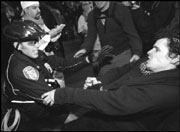IN 1998, MTV’s The Real World did a season in Seattle. Then there was Carla Betz, a cast member from Fox’s Temptation Island who claimed to be from the Emerald City. Now Seattle may get another experiment in reality TV, starring none other than Seattle City Council member Judy Nicastro.
“Three cameras will capture everything involved in the job of a City Council member,” announces an advertisement placed by Nicastro seeking interns for her new project, DemocracyLive.org, which she bills as “a first of its kind experiment in open government.”
Nicastro, the feisty upstart from New Jersey who stormed onto the City Council in 2000 by running on a platform of renters’ rights, says DemocracyLive.org is running into a variety of technical and financial challenges. While she is still working on the concept, she chose not to comment directly for this story.
“Camera One,” her ad continues, “will be in my office capturing the various meetings and discussions that take place with constituents, lobbyists, staff, and colleagues every day. Camera Two will be located in council chambers, where the bulk of municipal government takes place in committee meetings and weekly full council meetings. Camera Three will document the life of a council member outside of the office, following me into the community for meetings that occur in the neighborhoods and impromptu discussions with people on the street. A Web site will stream the coverage of all three cameras.” Such coverage, the ad suggests, will allow DemocracyLive.org to broadcast both policy discussions and “spontaneous reactions to events and crises.”
It may sound like The Truman Show, but Nicastro hopes it will be something else entirely. According to the ad, “the goal is to educate and inspire citizens to get involved in civics and make government more transparent and accessible.” In addition to the live Web streaming, the site may also include Nicastro’s “agenda of daily activities, text identifying meetings and participants, live chats, policy discussions, . . . and background on policy issues that are covered.”
“What is open government?” Nicastro’s legislative aide Charlie McAteer asks provocatively. “How open can you get?” He hopes that live streaming of Nicastro’s daily work as a council member can be used as a curriculum tool for social studies teachers to show how a bill becomes law. This, in turn, is supposed to help “get young people involved” and inspire “disenfranchised people who don’t think government is relevant to them.”
Lance Bennett, a UW professor of political science who runs a research project aimed at increasing participation by young people in local politics, says DemocracyLive.org “sounds like an interesting idea that will surely stand or fall on the interest of people using it.” Particularly in schools, he says, this will depend on how good its interactive features are. “Real time is boring. Kids on computers tend to not be patient just staring at a screen. They want to make it their screen and go where they want to go.”
Nicastro’s aide McAteer cautions that DemocracyLive.org “is more of a concept right now.” But there are plans and hopes for the future, and work has already begun to help make the project a reality.
McAteer says that Nicastro’s office has one intern who began working on the project last month and has plans to add two more interns by April 1. If all goes well with fund-raising, negotiations with technology providers, and curriculum planning with social studies teachers, the Web site’s plan will be finalized by April 15, and DemocracyLive.org will go live and online by Sept. 1 of this year.
Although plans are too uncertain for the costs to be estimated, McAteer says the site will be funded by an independent nonprofit and won’t receive any government money other than for the time he spends helping to set it up.
Last month, Nicastro had a meeting with former President Bill Clinton to specifically talk about DemocracyLive.org. Clinton, according to Nicastro’s recent e-mail newsletter, “expressed a desire to remain informed of our progress.”
Will such an idea catch on? And if it does, will it set off a wave of competition among other politicians to set up their own Web sites and camera crews? Surrounded by cameras and always live, our politicians would compete with one another for our attention and our support in real time even better than characters in reality-TV shows do.
Such could perhaps be the joys, and also the disquieting invasions of privacy, that distinguish new kinds of open government in the information age.








